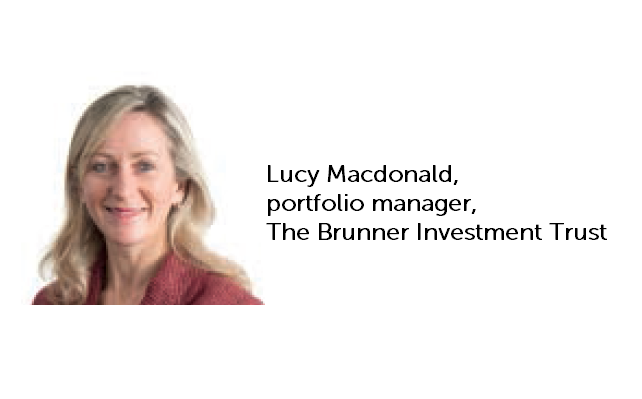Brunner Investment Trust has announced its final results for the year ended 30 November 2018. During the year, Brunner provided an Nav total return of 2.7%, which the trust says a little behind the composite benchmark index (70% FTSE World Ex-UK and 30% FTSE All-Share Index). BUT says its benchmark rose by 4.1% on a total return basis over the period, and BUT’s NAV underperformance was due to the 0.7% NAV cost of the debt restructuring and 0.7% of portfolio returns lower than the index. The chairman reports that Brunner’s average NAV has narrowed during the year although, over the course of the year it widened as the share price fell by 2.8%. Unfortunately, the announcement does not include the investment managers report or any detailed information on what drove Brunner’s performance during the year, so it is difficult to comment on it here. The announcement does include the chairman, Carolan Dobson’s, statement. We have included her comments below on the debt restructuring, which was a major development for the trust, as well; as her comments on outlook.
Brunner’s chairman’s commentary on debt restructuring
“The company’s balance sheet was transformed and simplified during the year following the repayment and refinancing of the two very expensive long-term debentures. In January 2018 the First Debenture Finance debenture was paid off at maturity using the company’s cash reserves. Subsequently, the second debenture (Fintrust) was redeemed for a total cost of £39 million (including accrued interest) which was funded by the issue of a £25 million fixed rate 30-year unsecured private placement note at a coupon of 2.84%, with the balance funded from a combination of existing assets and bank debt. Although the debt had not been due to mature until 2023, the board took the decision to repay it early in order to lock into a long term rate at more attractive pricing levels and to achieve a balance of financing sources and maturities. Following this refinancing exercise, the company’s weighted average interest rate on all of its structural borrowings and preference stock is 3.0%, compared with 9.0% previously.”
Brunner’s chairman’s commentary on outlook
“2018 was a year of heightened volatility across global markets, against a backdrop of ongoing trade tensions. Equity returns were weaker and our manager anticipates that these market conditions, as well as weak economic momentum and a more elevated level of market volatility, will continue to prevail. On a positive note, however, increased volatility and lower company valuations should offer more attractive buying opportunities than they did a year ago. With these factors in mind, the manager’s focus will continue to be on identifying those companies which can grow independently of economic cycles.
At the time of writing, the UK Government is yet to agree a trading arrangement with the European Union following the country’s scheduled departure from the EU on 29 March. This has created a heightened level of political and economic uncertainty in the UK. Although the company has 26% of its assets invested in the UK, the majority of these UK listed investments are international businesses, meaning that overall exposure to the domestic UK economy remains modest.
Looking ahead, the board shares the investment manager’s expectation that the resilience of overall company earnings in 2019 will be challenged by generally weaker global economic momentum, plus the great unknown of trade politics. Against this backdrop, the board is reassured by the manager’s balanced approach to stock picking. The essence of Brunner’s investment strategy is buying good quality companies at the right time and at the right price. The portfolio composition is based on detailed analysis so that every investment held in the portfolio is there for a good reason. This focus on stocks with the potential for structural growth, with good cash returns, strong management and balance sheets has served the company well over the long term and we are confident will continue to do so in the future.”
